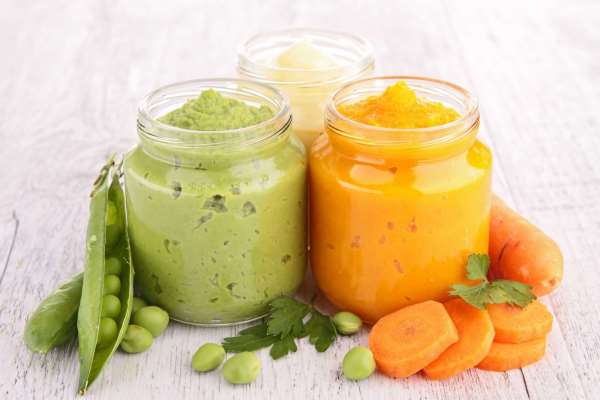Feeding a baby is really fun! Just think about it; at what other stage of life is such a ready form of excitement and entertainment available at every meal?
Feeding baby almost always includes a food fight to some degree, facial treatments, hair entanglements, and a very hands-on tactile experience.
When to Start Solids
The most common question when it comes to feeding a baby is when to introduce baby foods other than milk or formula. Each and every family is different, but in general there really is no set age that is “best”.
One milestone your baby should reach before the commencement of solid foods is the loss of tongue thrust. If baby is still using his or her tongue to push every foreign object out of his or her mouth, introducing solid foods is going to be an exercise in frustration. You also want to see that the baby can hold their head upright, sit up unsupported, and can open and close their mouth.
Most of these milestones are reached by about six months of age, but that does not mean parents must start feeding solid foods. As long as your baby is still growing, healthy breast milk can provide most of the nutritive needs for the first 24 months. This allows parents to slowly introduce foods when baby shows interest.
A baby should not be introduced to solid food prior to four months of age, unless otherwise advised by a doctor. Babies younger than four months are not capable of eating solid food safely, and should be kept strictly to a formula- or milk-based diet.
First Solids
The term solid food is used loosely. A baby’s first foods are rarely solid; they are just more solid than milk is. Early foods must be presented in a pureed or mashed fashion.
The best options are foods which are low in sugars, low in protein, and are known for their low allergy reaction. Each culture has certain foods it considers best as starters.
When choosing first solid foods, start slow. Introduce single-ingredient foods to your baby, one at a time. Introduce a new food a few days after a prior one. By giving your baby new foods one at a time, it will be easier to identify potential allergies. By seven to eight months, your baby should be eating several different kinds of food.
The Menu
A good first food your doctor might suggest is rice cereal. Rice cereals rarely cause an allergic reaction, they are supplemented with vitamins and minerals, and they are quite bland. It is great to use breast milk or formula to water down the rice cereal to a very watery consistency so your baby can swallow it easily.
A list of other great first foods includes mashed banana, mashed or pureed squashes like pumpkin, acorn or butternut, mashed sweet potato, and applesauce. These foods tend to be well-liked by babies and are easy for them to eat.
Getting It In Their Mouth
To be successful with feeding a baby their first solid foods, parents need to be prepared to help, a lot, and anticipate taking plenty of time to get through a feeding. Meals should be spoon-fed at the same time each day. Start by preparing only one meal each day and set it for the same time each day. Choose a time when your baby is usually well-rested and in a good mood.
Babies are just as particular about their foods as grown ups are, so offer foods the way you plan to offer them from now on. For example, if you start your baby with foods at room temperature, you will not need to worry about heating a meal when you are out later on.
Eventually, once your child's fine motor skills have developed sufficiently, they will be able to begin learning how to use utensils. This is going to be a messy process, so be ready! If you want to get your child used to the idea of feeding themselves, you can allow them to occasionally eat certain foods with their hands. This will be messy, but it will introduce the idea of self-feeding before your baby can handle utensils.
Once your child is able to use utensils, slowly help them learn. Babies often learn by imitation, so showing them how to use a fork or a spoon can work well. A spoon will likely be the first utensil you start with, since it's the easiest to use. Be patient, and before you know it your baby will be eating food all on their own!
Be certain both your baby and the feeding parent are covered with bibs to handle any splatter, and have fun!
The image featured at the top of this post is ©iStock.com/margouillatphotos
